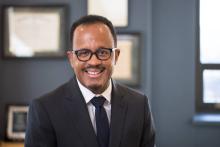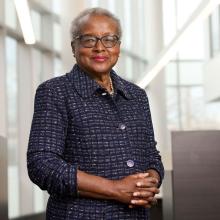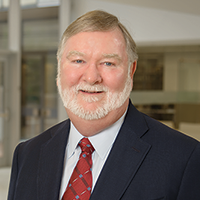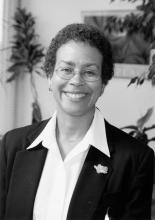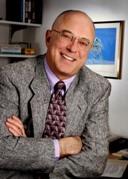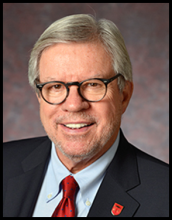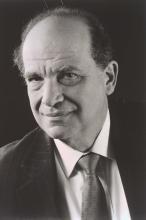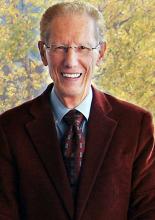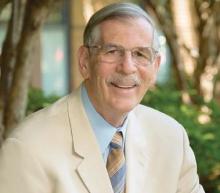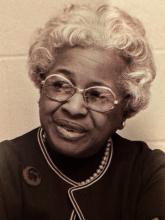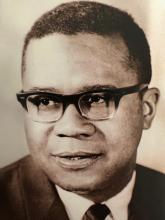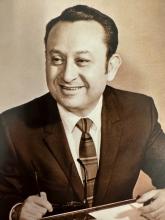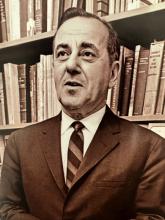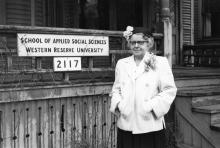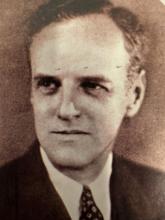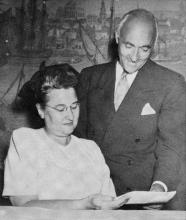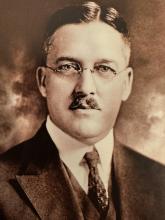- Dexter R. Voisin: 2022–Present
- Sharon E. Milligan: 2021
- Grover C. Gilmore: 2002–2021
- Darlyne Bailey: 1994–2002
- Wallace Gingerich: 1992–1994
- Richard L. Edwards: 1988–1992
- Arthur J. Naparstek: 1983–1988
- John A. Yankey: 1980–1981
- Merl C. Hokenstad, Jr.: 1974–1983
- Ruby B. Pernell: 1973–1974
- John B. Turner: 1968–1973
- Herman Stein: 1964–1968
- Nathan E. Cohen: 1958–1963
- Margaret H. Johnson: 1950–1958
- Donald V. Wilson: 1948–1949
- Leonard W. Mayo: 1941–1948
- James E. Cutler: 1915–1941
Dexter R. Voisin: 2022–Present
Dexter R. Voisin is the Jack, Joseph and Morton Mandel Dean in Applied Social Sciences at Case Western Reserve University. Before his appointment, he was dean of the Factor-Inwentash Faculty of Social Work and the Sandra Rotman Endowed Chair in Social Work at the University of Toronto. He also held a full professor tenured appointment at the University of Chicago for two decades at the Crown Family School of Social Work, Policy, and Practice.
Voisin's major priorities for the Mandel School are to significantly increase financial student supports, elevate the national visibility of the school and advance innovative community-university educational and research partnerships.
Voisin’s research examines how structural, racial, and interpersonal violence impact health behaviors among minoritized populations. He has authored more than 200 peer reviewed publications and commentaries and secured more than 16 million dollars in extramural as principal or co-investor with his research informing health policy in Illinois. He is recognized to be among the top 2 percent of scientists in the world within his field. His latest project is America the Beautiful and Violent: Black Youth and Neighborhood Trauma in Chicago, published by Columbia University Press in 2019.
Sharon E. Milligan: 2021
Sharon E. Milligan is an associate professor at the Mandel School. She served as the Jack, Joseph and Morton Mandel Interim Dean in Applied Social Sciences from July to Dec. 2021. She previously served for 14 years as associate dean for academic affairs and student services, chair of the MSSA/MSW and MNO programs, and co-director of the Center on Urban Poverty and Community Development. Milligan led the school through curriculum and degree name changes and spearheaded the online social work master’s degree.
She has taught graduate courses in community development, social welfare policy, and research methodology and led several funded research projects focusing on health and minorities. Her publications appear in Women and Health, The New England Journal of Medicine, Controlled Clinical Trials, Social Work in Health Care, The Gerontologist, Ethnicity and Disease, Community Mental Health Journal and Arthritis Care and Research.
In 2020, Milligan was reappointed to the Council on Social Work Education’s Katherine A. Kendall Institute for International Social Work Education. She also serves as a representative of the International Association of Schools of Social Work, president of the Cleveland Museum of Art’s Friends of African American Art, and is a member of the McGregor Foundation’s board of directors.
Grover C. Gilmore: 2002–2021
Grover C. Gilmore is the Jack, Joseph and Morton Mandel Dean Emeritus in Applied Social Sciences and Professor Emeritus in the Department of Psychological Sciences at Case Western Reserve University. Gilmore’s leadership propelled the Mandel School toward educational excellence, innovation and enhanced financial security. During his time as dean, the school consistently ranked among U.S. News & World Report’s top 10 social work schools and No. 1 in Ohio.
Under his leadership, the school launched an undergraduate social work minor, seven research and training centers and the university’s first short-term study abroad program. Gilmore recognized the opportunities inherent in online learning early, leading the school to establish the university’s first online degree program in 2013. In 2020, he oversaw the launch of a new innovative generalist curriculum, designed to consolidate the application and integration of knowledge and skills and emphasize two hallmark themes: leadership and social justice.
The school also flourished philanthropically, raising $44 million in the university’s Forward Thinking capital campaign, exceeding the original goal by $12 million. The funds supported the 2016 expansion and renovation of the Mandel School building, the addition of a second building (the Jack, Joseph and Morton Mandel Center for Community Studies), program support, scholarships and endowed professorships.
Gilmore has been funded by the National Institutes of Health for over 35 years to support his interdisciplinary research with colleagues in biomedical engineering, geriatrics, ophthalmology, neurology, pulmonology and psychiatry. His research programs focused on identifying sensory and cognitive problems that affect a person’s ability to perform at their full potential. He has pioneered methods to improve Alzheimer’s patients’ perceptual and cognitive performance, and demonstrated that a portion of the cognitive problems associated with aging and the memory problems in Alzheimer’s disease may be attributed to sensory decline and not to higher-order cognitive functions.
Gilmore received the John S. Diekhoff Award for Distinguished Graduate Teaching in 1984 and was nominated multiple times for the Carl F. Wittke Award for Excellence in Undergraduate Teaching. He chaired the psychology department for five years and the Faculty Senate for one year, and served as associate dean of the College of Arts and Sciences from 2000-2002. Gilmore also served on boards in the community and nation including the Cleveland Hearing and Speech Center, Magnolia Clubhouse, the Graduate School of Social Work at the University of Denver, and the University of New England.
Darlyne Bailey: 1994–2002
During her tenure, Darlyne Bailey expanded the Mandel School’s endowment and research funding, worked with the Mandel Foundation to establish the Manel Fellows and Mandel Scholars, and invited Congressman Louis Stokes to join the faculty in 1998 upon his retirement from Congress.
In 1995, she organized the first Midwestern Deans and Directors Conference at the Mandel School which produced the White Paper on Social Work Education—Today and Tomorrow.
Bailey’s career has been founded on a commitment to multidisciplinary and multicultural practice. She has been the Principal Investigator for many studies around the country and has been named a Group XIII Fellow of the W.K. Kellogg National Leadership program. She was also named one of the most influential African American social workers by the National Association of Social Workers. Bailey has served on many boards, including the Stoneleigh Foundation and the Maternity Care Coalition in Philadelphia, the National Human Services Assembly in Washington, D.C., the Suzanne and Richard Pieper Family Foundation in Wisconsin, and the New York-based Frances Hesselbein Leadership Institute. She has written articles, book chapters and co-authored several books.
Wallace Gingerich: 1992–1994
Wallace Gingerich is Professor Emeritus of Social Work and founding director of the Office of Educational Assessment at the Jack, Joseph and Morton Mandel School of Applied Social Sciences.
His teaching and research interests include ability-based curriculum and learning, clinical practice, practice evaluation, solution-focused therapy and internet applications in clinical practice. Gingerich co-chaired the Mandel School’s Assessment Task Force in the early 90’s, which eventually led to the development of the Ability-Based Learning Program.
During his career at the Mandel School, much of Gingerich’s research focused on educational outcomes in social work education. He co-led a task force that identified the abilities students should develop during their master’s social work program, which then became the benchmarks for measuring educational success. Instead of focusing on what students knew, the group emphasized what students could do in their work with clients and how students demonstrated their abilities in the field.
Gingerich has published widely and consults with organizations on outcomes-based education, solution-focused brief therapy and information technology. His memberships include the National Association of Social Workers, the Council on Social Work Education, the American Association for Marriage and Family Therapy, the Society for Social Work and Research and the International Society for Mental Health online.
Richard L. Edwards: 1988–1992
Under Richard L. Edwards’ leadership, the Mandel School relocated from its former location at Beaumont Hall to a newly-constructed building that is its current home on the corner of Bellflower and Ford roads.
While he served as President of the National Association of Social Workers for a two- year term from 1989 to 1991, the organization introduced into Congress the first fully-comprehensive and budgeted national health care reform that really sparked the national debate and raised the visibility of the issue.
Edwards studied the management and organizational effectiveness of public-sector and nonprofit organizations, and is the author of numerous publications, mainly about the impact of social policy on service delivery, organizational and leadership effectiveness, and social work services in rural areas. He served on the editorial boards of numerous professional journals and was the editor-in-chief of the 19th edition of the Encyclopedia of Social Work.
Arthur J. Naparstek: 1983–1988
Arthur J. Naparstek was an expert on urban redevelopment whose ideas for revitalizing neighborhoods served as models for policy on a local, national and international level. He was appointed to the National Commission on Neighborhoods and the President’s Commission on Mental Health’s Task Panel by President Jimmy Carter. When Naparstek became dean of the Case Western Reserve University School of Applied Social Sciences, he raised funds to expand the school into a new building which was then renamed the Mandel School of Applied Social Sciences.
Under his administration, the school established the Intensive Semester program in Cleveland and three off-campus sites, the Mandel Center for Nonprofit Organizations, the Center for Urban Poverty and Social Change, and set the stage for the later establishment of the Center for Practice Innovations. He also established the school as the first in the country to use 4A dollars for master’s training of income maintenance workers.
Senator Barbara Mikulski called Naparstek "one of our most imaginative public policy thinkers." She said he cared "not just about programs, he put people first." Mikulski worked with Naparstek and Representative Louis Stokes on housing legislation, a collaboration she described as an "iron triangle," of which "Art was the brain trust."
Naparstek’s work helped redefine the function of public housing through community-building. As director of the Cleveland Foundation Commission on Poverty in the early 1990’s, he oversaw the drafting of the Cleveland Community-Building Initiative report which became the foundation for the U.S. Department of Housing and Urban Development’s Urban Revitalization Demonstration Act of 1993, known as HOPE VI. U.S. In 1994, Naparstek was appointed the Corporation for National Service by President Bill Clinton.
He worked as a senior associate for Urban Institute, a think tank in Washington D.C., directing HOPE VI. Naparstek influenced communities through his involvement with Jewish organizations in Cleveland and Israel. While he served as co-chairman of the Jewish Community Federation of Cleveland’s Partnership 2000 program, he applied his community building skills to improve the economic base and sense of community in a city in northern Israel. Over the course of his social work and academic career, Naparstek co-authored four books and published many articles about the importance of community-building and mental health in public policy. Read more on Naparstek's Wikipedia page.
John A. Yankey: 1980–1981
John A. Yankey is the Leonard W. Mayo Professor Emeritus at the Jack, Joseph and Morton Mandel School of Applied Social Sciences.
Prior to coming to the Mandel School, Yankey worked in the West Virginia Department of Human Services. During his last six years with that agency, he served as the statewide agency’s Chief Operating Officer, assuming responsibility for the day-to-day operations of its public assistance, social services, Medicaid, food stamps and childcare programs. He was also responsible for coordinating governmental relationships and strategic planning.
During his years at Case Western Reserve University, Yankey administered a number of statewide leadership training programs with public child welfare and human services agencies, served in a variety of administrative positions within the Mandel School and Center, and carried out legislative liaison responsibilities for Case Western Reserve as assistant to the president.
Yankey has published a number of articles in public welfare, social work and nonprofit management journals.
His consulting engagements in strategic planning, organizational development, board development, fundraising, nonprofit mergers and consolidations, and management training allowed him to work with hundreds of public and nonprofit organizations throughout the United States. He was also heavily involved in both studying strategic alliances, especially mergers, acquisitions and consolidations, and in facilitating organizations through feasibility studies to establish such alliances.
Among his awards, Yankey has been honored as Outstanding Social Worker in Greater Cleveland and Social Worker of the Year in Ohio. He has also been recognized by Cleveland City Council and has been commended by the Ohio Legislature for his contributions to the nonprofit sector and to Case Western Reserve University. He has been selected on numerous occasions as Teacher of the Year by Mandel School students and is the recipient of the Outstanding Alumni Award by Alderson-Broaddus College and the Outstanding Alumni Award in Education by the University of Pittsburgh School of Social Work.
Merl C. Hokenstad, Jr.: 1974–1983
Merl C. Hokenstad, Jr.’s contributions to the fields of social work and social welfare have been many at the national and global levels. In a career spanning more than four decades, he is recognized as a worldwide leader in social work education and research. Hokenstad is currently the Ralph S. and Dorothy P. Schmitt Professor Emeritus at the Jack, Joseph and Morton Mandel School of Applied Social Sciences, Professor of Global Health in the School of Medicine, and Distinguished University Professor Emeritus at Case Western Reserve University.
A prolific scholar, his publications include nine books and numerous articles, chapters and monographs in the fields of comparative social welfare, care of the elderly and international social work practice and education, including as the lead editor of Teaching Human Rights in 2013, a resource manual for teaching human rights in social work courses. The book reflects the CSWE’s initiatives to integrate human rights into established courses or to help create new ones.
Locally, Hokenstad served on the Board of Directors for the Center for Community Solutions providing strategic leadership to improve health, social and economic conditions in Northeast Ohio and was a member and former chair of its Council on Older Persons, which advises on care for the local aging population. He also chaired the 30-member advisory council and nine-member executive committee for the City of Cleveland’s Age-Friendly City program—Cleveland joined the World Health Organization’s Age-Friendly City movement as a result of Hokenstad’s visit to Geneva in May 2014 and submitted its three-year action program to the World Health Organization.
His national and global impact has been acknowledged and recognized by numerous honors which include Social Work Pioneer from the National Association of Social Workers, Educator of the Year by the Ohio Association of Gerontology and Education, and the Significant Lifetime Achievement Award from CSWE. A high-impact educator, scholar and citizen with a deep commitment to service and learning, these accolades reflect worldwide recognition of the profound influence of his illustrious and still-active career, which has shaped the field of social work in America and around the globe.
Under Hokenstad’s administration, the school developed curricula in alcoholism, gerontology, health and human services management and occupational social services. He also initiated joint degree programs with law, management, medicine and nursing at CWRU.
Ruby B. Pernell: 1973–1974
Ruby B. Pernell was the first African American woman dean at Case Western Reserve University. She came to the university as the Grace Longwell Coyle Professor in Social Work in 1968, and she continued to serve in an emerita professor role from 1982 until her death in 2001.
At Case Western Reserve, her contributions included the introduction of curriculum in management of human services, planning for undergraduate social work programs, and membership on the Afro-American Studies Program Advisory Committee.
During her career, Pernell became a recognized scholar in social group work, international social welfare and other topics. She contributed her knowledge in social policy through work with countries such as India, Sudan, Egypt and Jamaica. She is one of only two social welfare attachés in American history and held consulting roles with government agencies and served on the boards of several community organizations.
Pernell was also a founding member of the Association for the Advancement of Social Work with Groups.
John B. Turner: 1968–1973
John B. Turner’s influence and titles ranged nationally and internationally through all his work. World War II had come along when he was working on his undergraduate schooling, but he decided to join the military as a Tuskegee Airman, becoming a First Lieutenant. When the war was over he resumed work on his bachelor’s degree and went on to secure his Master of Science in Social Administration at CWRU.
For 10 years he served as an instructor, assistant and associate professor, and professor in the CWRU School of Applied Social Sciences, and served as associate dean and dean from 1968 until 1973. Beginning in 1970, Turner's international focus included participation in the International Council on Social Welfare as a member and chairman of the U.S. Committee.
He also served as a short-term American grantee of the U.S. State Department in Zambia, Ethiopia, Kenya and Uganda, a charter member of the International Association of Applied Social Scientists, a Trustee of the Cleveland Institute of Art and as an elected City Commissioner in East Cleveland. Turner was also a prolific writer with numerous published articles and books to his credit.
Herman Stein: 1964–1968
Herman Stein served as a social work educator, administrator, consultant and social work researcher both nationally and internationally.
In 1947 he went to Europe with his wife to work for the American Jewish Distribution Committee in Paris, but he left this position due to his interest in helping the survivors of the Holocaust. He remained there until 1950 when he began his series of employment as a social work educator and administrator.
At Case Western Reserve University, Stein served as professor of social administration, coordinator of social and behavioral science, dean of the school, provost of social and behavioral sciences, university provost, university vice president and university professor, the highest academic rank at CWRU. Stein served many organizations, including the International Association of Schools of Social Work, the International Council on Social Welfare, UNICEF, the National Academy of Sciences, the American Joint Distribution Committee, the American Psychoanalytic Association, the Council on Social Work Education, the National Institute of Mental Health and the Department of Health, Education and Welfare.
Additionally, Stein won many awards— the National Association of Social Workers’ Lifetime Achievement Award, the Council on Social Work Education's Distinguished Service Award and the Council of Social Work Education's Significant Lifetime Achievement Award. In 1994 he received the Smith College School of Social Work's Day-Garrett Award for distinguished service, and was also inducted into Phi Beta Kappa and Columbia University's School of Social Work Hall of Fame.
As the first dean with a doctorate in social welfare, he represented the new maturity and scope of a profession whose horizons had broadened to encompass a worldwide perspective on problems of social welfare. Stein was awarded the University Medal, the highest honor one can receive at Case Western Reserve, for his leadership and expert judgment in guiding the University through the turbulent sixties.
Nathan E. Cohen: 1958–1963
Honored as a Social Work Pioneer by the National Association of Social Workers, Nathan E. Cohen served as the organization’s first president from 1955 to 1957. He devoted his long professional career to the improvement and expansion of social work. Throughout his career he was a leader in many organizations including the American Association of Schools of Social Work, the American Association of Group Workers and the National Conference on Social Welfare.
Additionally, Cohen served as a special consultant to the National Institute of Mental Health, the Children's Bureau and the Office of Vocational Rehabilitation. He worked to broaden the field of social work by encouraging colleagues to look at not just the psychological aspects, but also the social, political and economic forces that contribute to problems in society.
Cohen also worked to improve social work education. His influence spread across the world when he helped improve social welfare programs and education in India, Hong Kong and several South American countries. Many of his works were published, including Social Work in the American Tradition and Citizen Volunteer. An able administrator and teacher, he gradually made the dean’s office the locus of power for relating social work education to the needs of the community.
Margaret H. Johnson: 1950–1958
That the first person to receive the Master of Science with the designation in Social Administration degree in 1919 also became the school’s first female dean reflects what a vital role Margaret H. Johnson had in the growth and development of the school—as a student, faculty member, alumna and visionary leader.
She worked as executive secretary of the Cleveland chapter of the League of Women Voters and then as assistant executive secretary of the National League of Women Voters. In 1927, Johnson returned to Cleveland as executive secretary of the school. The next year she became an instructor, and in successive years became assistant and associate professor. She was promoted to professor in 1939. In addition to her duties as a faculty member she served as assistant dean and was acting dean several times.
Under her leadership, Beaumont Hall—the school’s first dedicated building on campus—was funded and built in 1951, and the doctoral program was founded in 1952.
Johnson served as chairwoman of the American Association of Social Workers and Directors of the Association of Social Workers of Cleveland; an executive committee member of the National Conference of Social Work; and a member of the Advisory Committee of the Department of Public Welfare of Ohio, Advisory Committee of City Relief Administration of Cleveland, Board of Directors of Women’s City Club and Board of Trustees of Welfare Federation.
Donald V. Wilson: 1948–1949
Dean for just one year, Donald V. Wilson came to the school after a distinguished academic and military career.
He had extensive experience in settlement houses and welfare work before being drafted into the U.S. Army, where he ultimately became responsible for creating welfare services for the country of Japan under the military government of the United States Army. Wilson viewed the new roles of social workers in the postwar period as crucial to the stability of governments in former combat zones across the world.
Leonard W. Mayo: 1941–1948
Leonard W. Mayo was appointed dean of the school in 1941, possessing a passion for its important work and a real gift for communicating the many ways the wider community benefited from that work. One of his major contributions to the school was his transformation of that passion into badly-needed financial support. Mayo’s efforts built the school’s reputation, both locally and nationally, a fact noticed by the university, which appointed him as vice president in 1949.
Mayo strongly influenced policies on child welfare, mental and physical disabilities. He held offices with the Child Welfare League of America, the National Conference of Social Work and the International Union for Child Welfare. He also served as chairman of President John F. Kennedy’s Committee on Mental Retardation, whose recommendations helped to address one of the nation’s most serious and costly health issues.
While working in Cleveland he served as chairman of the Metropolitan Council of Greater Cleveland and assistant director of Civilian Defense in Cuyahoga County. As chairman of the National Council of Churches’ Department of Social Welfare, he made great contributions to the field of church-related social welfare.
James E. Cutler: 1915–1941
A scholar and progressive social reformer who saw research and teaching as tools to change society for the better, James E. Cutler was an early and vocal advocate for the foundation of a university-affiliated professional school of social work.
His strong commitment to creating curricula that balanced social science methodology, community organization, and individual case work was coupled with a dedication to using Cleveland as a practical classroom—a visionary strategy that immediately put the school at the forefront of social work education.
Cutler was also the first president of the Cleveland Grand Jury Association, an organization concerned with public education about issues around law enforcement, criminal justice and rehabilitation—a cause he took up with enthusiasm after his retirement as dean in 1941.


